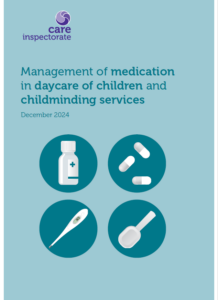![]()
Medication
What is this?
Many children in settings, at some point or another, will need medication, whether this is in the short term (finishing antibiotics) or long term (viral wheeze/ antihistamine for seasonal hay fever). These children will require a completed ELC Medical Care Plan incorporating SBC prescription medication request and record before administration of medication in setting.
For the few children with complex needs under specialist medical supervision an Individual health care plan (IHCP) must be completed as per SBC Multi-agency ‘Administration of medication and health care procedures SBC’
Key messages:
In your setting, you must know:
- Recorded information is up to date, includes all the necessary information and reflects children’s current needs.
- Consent is reviewed at least every three months or at the start of a new term.
- The information on forms and containers reflects the dispensing label.
- What medication is on the premises (including adult’s medication), and where it is stored.
- Medication is in date.
- Medication is stored correctly with the permission form.
- Lifesaving medication is easily accessible, including when on outings.
- Practitioners are knowledgeable about children’s medicine, medical conditions and allergies. This may include triggers, how children will present, what action to take, and what action to take if the initial action is ineffective.
- The procedure if the wrong dose is given or medication is given to the wrong child.
- The procedure if the child refuses or spits out the medication.
- Any medication administered has been administered by the parent or health professional before being given to the setting.
(Management of Medication in Daycare and Childminding, Care Inspectorate, 2024)
Ways we can do this:
Complete and review regularly (in line with your Quality Assurance Calendar) SBC Medication Audit 2025
Use the Care Inspectorate “Management of medication in daycare of children and childminding services” document.
Use ‘SBC Multi-agency policy for the administration of medication and health care procedures‘.
Ensure the setting’s medication proforma has all the information required.
Ensure that all medication is stored correctly:
-
- Emergency medicines, such as inhalers and adrenaline medication, must be readily available and accessible to practitioners- they must not be stored in a locked cupboard.
- Non emergency medicines must be stored in a locked cupboard or locked container, which is out of children’s reach in an area below 25°C.
Ensure all practitioners, including supply, have the setting’s medication guidance.
Everyone in the setting has a good knowledge of the guidance around storage and administration of medication.
Appoint a practitioner to oversee medication, including sending expiry slips to parents, overseeing the on-site medication list, and ensuring all medications are correctly documented.
Add dates of reviews and auditing to Quality Assurance Calendar.
FLOWCHARTS
In consultation with a relevant health official where appropriate (depending on nature of condition) and a parent/carer, have a symptom and action flowchart in place that can be easily accessed to support all staff. SBC editable templates can be used as a STARTING POINT but MUST be amended with the relevant health official (where appropriate) and with parent guidance and agreement. (Examples of relevant health professionals may be a Diabetes Nurse, Health Visitor, School Nurse, GP etc.)
Symptom & Action Flowchart for Allergic Reaction NOT including an Adrenaline Auto-injector
Symptom & Action Flowchart for Allergic Reaction Including an Adrenaline Auto-Injector
Symptom and Action Flowchart for Asthma Attack
**New SBC Medication Audit 2025
Medication storage box label template
ELC Medical Care Plan incorporating SBC prescription medication request and record
Medication onsite record – for staff and children
Guidance – Medical Care Plan incorporating SBC prescription medication request and record

